Anthropology News Archive | 2019
-
News | 2019
-
In Memory of Dr. Robert L. Williams
Dr. Robert L. Williams, or “Father Robert,” as we called him passed away on January 5, 2019. After his “retirement” as a priest and bishop of the Western Rite Orthodox Church, Father Robert received his MA in Anthropology at Texas State in 2007 (mentor-Reilly) and his PhD at UT-Austin in Latin American Studies in 2009. Father Robert wrote several important books on the Mixtec Codices and taught several courses in the department. Read Fr. Robert’s obituary.
-
Archaeology Graduate Student Interviewed by Kenosha News
Archaeology graduate student, Ted Kmiec (Advisor, Dr. Kent Reilly) was interviewed by Kenosha News. In the interview, Ted discusses his undergraduate degree work with CAS, his recent field school in Belize, his graduate studies under Dr. Reilly and more.
-
Congratulations to Students at NSF-REU Conference
Congratulations to our students who recently presented at the 2nd Annual Undergraduate Research Conference for the NSF-REU program. Our students presented their research from "Exploring Globalization through Archaeology," which is a NSF-REU program led by Drs. Todd Ahlman, Ashley McKeown and Nick Herrmann. The student posters and presentations were excellent, and reflected their hard work and the intensive mentorship of Todd, Ashley and Nick.
Doctoral student, Courtney Siegert, was also one of two guest speakers for the conference. Courtney did an excellent job as well. She described Operation ID and their work locating, identifying and repatriating the remains of migrants who have died in South Texas. Some members of the audience were in tears.
-
International Scientists Bring Understanding of Human Evolution
Dr. Britt Bousman and his collaborators, Michael Toffolo (University of Bordeaux Montaigne) and Kristen Wroth (University of Tübingen), took a break in their archaeological excavations when they were invited to speak to faculty, students and researchers at the University of the Free State in Bloemfontein, South Africa about their research in the nearby Modder River Valley. A large crowd attended their three presentations. Dr. Bousman has been collaborating with Professor Louis Scott from the UFS, and Drs. James Brink and Lloyd Rossouw from National Museum for the last three decades.
-
Drs. Danny Wescott and Deborah Cunningham receive NSF Grant
Drs. Danny Wescott and Deborah Cunningham’s NSF grant, “Collaborative research: obesity as a natural experiment to investigate bone functional adaptation,” has been approved. Danny and Deborah are working with a colleague from Johns Hopkins. The grant is for $255,500, split between the two institutions. Importantly, there are funds for MA and PhD research assistants. It will also pay for two years of the maintenance contract for the micro-CT system, which is a huge benefit to FACTS.
-
Dr. Wescott Interviewed by CBS Austin
Dr. Wescott was recently interviewed by CBS Austin for the work he and rest of the Forensic Anthropology Center are doing with various area law enforcement agencies. Dr. Wescott and his team help law enforcement identify remains through dental records or DNA analysis. You can read the watch the interview and read more about their work on CBS Austin.
-
Shumla Featured on Nation Swell and Chemical and Engineering News
Shumla was featured on the program, Nation Swell, explaining their current work on the Lower Pecos murals and climate change. The degradation is very rapid. Four Texas State/Anthropology alumni are employed by Shumla and are in the video (Amanda Castaneda, Charles Koenig, Vicky Roberts and Jerod Roberts).
Additionally, Shumla chemist, Dr. Karen Steelman was interviewed for Chemical and Engineering News for her work using PXRF technology to further study rock art. You can find the video on the Chemical and Engineering News website.
-
Department Students and Faculty Acquire Microscopy Equipment
Congratulations to Sophia Mavroudas (PI) and co-PIs Nick Herrmann, David Falleur (Clinical Laboratory Science), Michelle Hamilton, Danny Wescott, and Jodi Jacobson on their National Science Foundation: Major Research Instrumentation Program (NSF MRI): Acquisition of Microscopy Equipment to Enhance Histological Research in Forensic Anthropology, Biology, and Bioarchaeology! Their award is $255,140.
Project Summary
Overview
This request is for the acquisition of an integrated microscopy imaging and data analysis suite that consists of a Leica DM6M microscope and Leica M205C Stereoscope both with internal cameras that are connected to a central computer with associated Leica Aperio ScanScope CS2 slide scanner to enhance Texas State University’s research and outreach programs in forensic anthropology, biology, and bioarchaeology. This microscopy imaging system is a user-friendly system that will impact the large group of students and researchers (majority women) from the undergraduate through to the postdoctoral level who are part of the premier Forensic Anthropology Center at Texas State (FACTS) at Texas State University, a Hispanic Serving Institution(HIS).Intellectual Merit
As an asset of FACTS, this equipment would foster synergistic collaborative research and interactive teaching that will elevate the new PhD in Applied Anthropology Program and increase faculty and student federally funded research in forensic anthropology, biology, and arcaheology. Combined with existing FACTS resources, it will support innovative experimental studies including controlled human decomposition experiments that can model the microscopic diagenesis of human bone throughout the post mortem interval as well as macroscopic trauma investigation from vulture scavenging of human remains. The associated stereoscope with imaging software will also allow for novel and detailed 3D modeling of skeletal trauma and pathology from documented collections as well as forensic casework and bioarchaeological samples. The acquisition of this equipment would help build and make available to researchers the first ever referential catalog of histological human variation from the rapidly expanding Texas State University Donated Skeletal Collection (TXSTDSC). The resulting activities if the proposal were funded include the scientific training of women and underrepresented groups, undergraduate STEM training, graduate student research and professionalization, and the expansion of FACTS workshops to include histology and surface imaging. The microscopy system will allow FACTS to build on existing research programs that focus on bone histology in an applied context including the investigation of human vs nonhuman bone differentiation, histological mammal species identification, human ageing, dental histology season-of-death estimation, dental histology studies of pathology and stress, the application of GIS technology to study bone histomorphology, as well as histological human variation and its association with socioeconomic status, sex, ethnicity, age, disease, and genetics.Broader Impact
The potential of the proposed equipment to advance knowledge and impact a large number of female STEM students is immense. Upon acquisition, this equipment would directly impact the academic experience of 31 graduate students 29 of which are female. Mentored by FACTS faculty, these students will be uniquely positioned to use this instrumentation and associated imaging software for detailed 3D measurement and documentation of trauma, pathology, and microdefects that are important for accurate forensic case analysis and scientific testimony. These activities have direct impacts on the success of our justice system to prosecute criminals and serve society. The images generated by this equipment will be used to train forensic anthropology students and practitioners to improve the overall caliber of forensic anthropologists within the United States.This equipment will be integrated into existing training modules for students and professionals. The user-friendly interface will allow undergraduates to acquire novel microscopy experience in biology, anthropology, and archaeology. These same features will also allow it to become part of FACTS’ established outreach programs for students K-12 a high majority of which come from minority backgrounds underrepresented in science.
-
Ancient Southwest Texas Project and Shumla Team Up for 2019 Field Methods Program
Over the four week program, the students had the opportunity to excavate an Archaic midden and survey for historic artifacts with archaeologist Dr. David Kilby, as well as record ancient rock art with Dr. Carolyn Boyd and the Shumla research team. In fact, the students documented five sites as a part of the Alexandria Project. They learned how to capture gigapan images, SfM images, create 3-D models, complete TexSite and Rock Art Site forms. They even completed site summaries for Texas Parks and Wildlife and The Witte Museum about our work and findings at Vaquero Shelter and White Shaman Annex sites, respectively. Through this collaboration the students were engaged in investigating all aspects of the Lower Pecos archaeological record. Very impressive results!
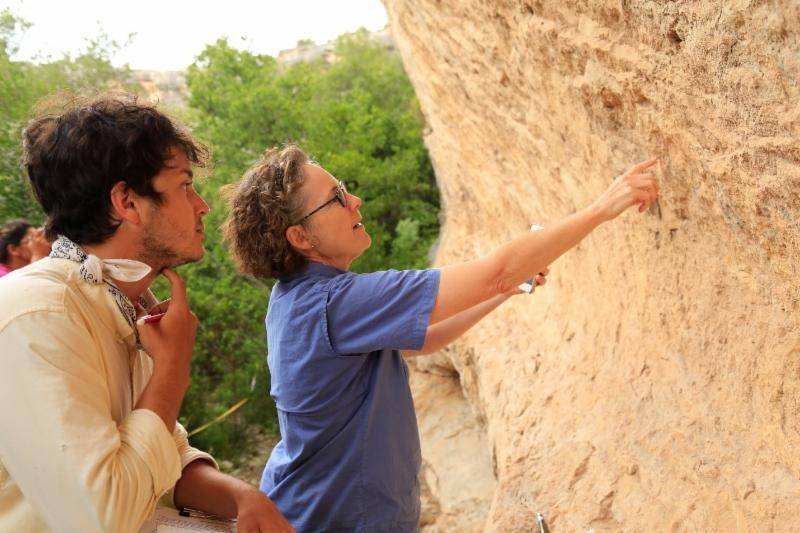
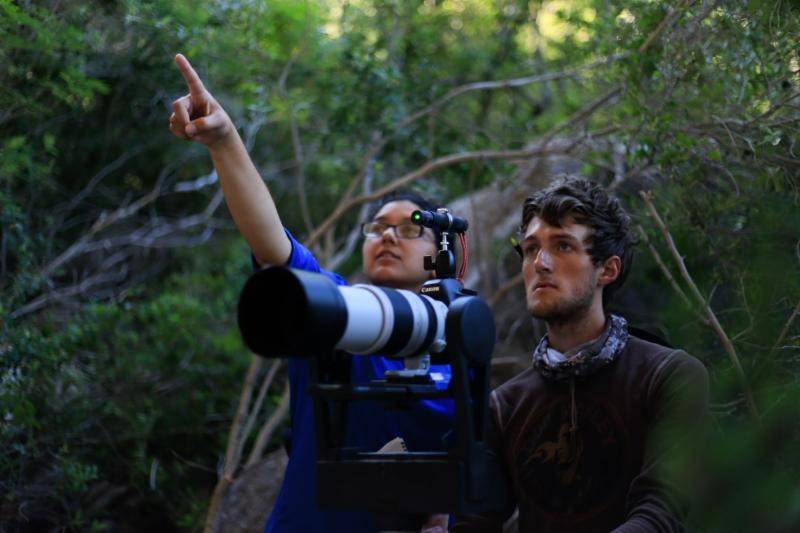
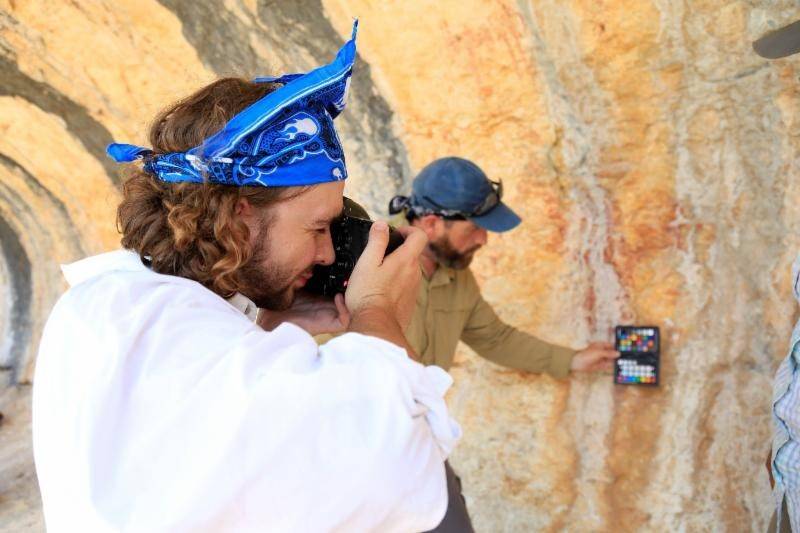
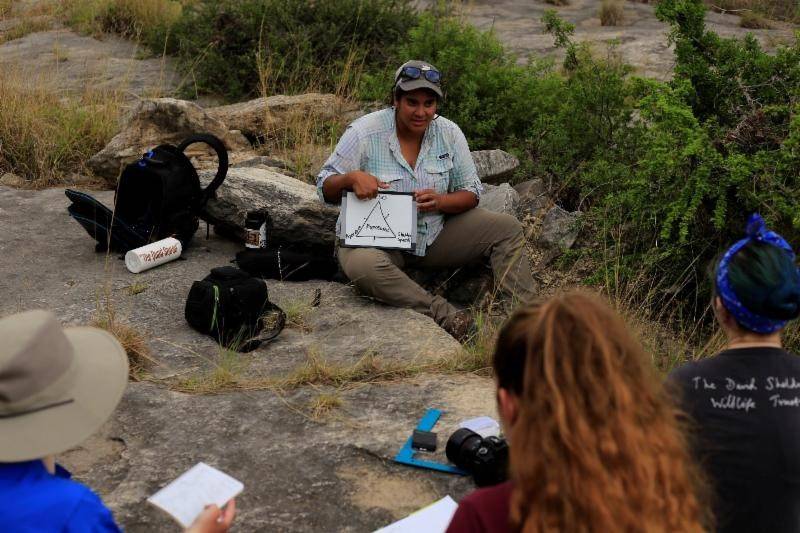
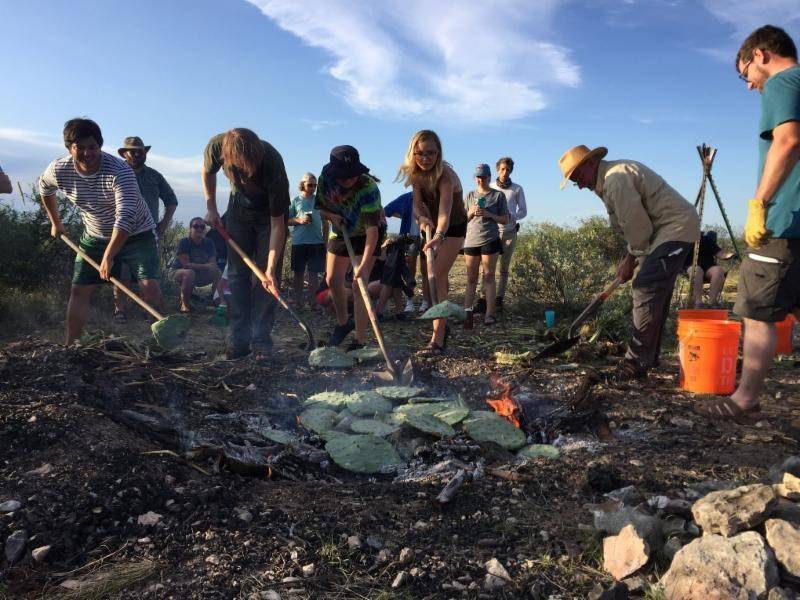
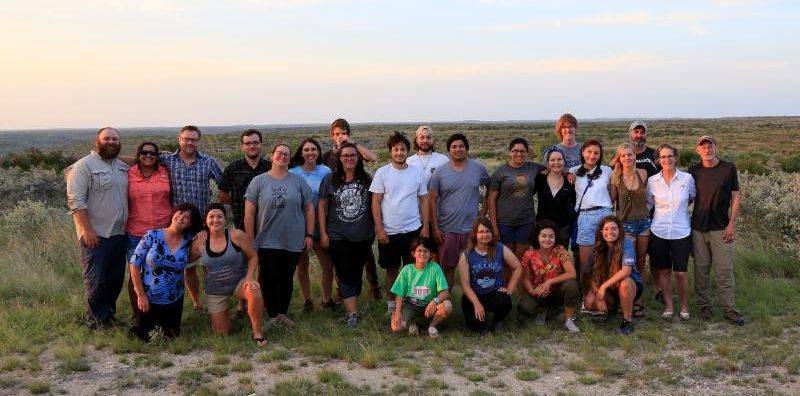
-
Undergraduate Student Receives Phi Kappa Phi Fellowship
Congratulations to undergraduate student, Chisom Ogoke who was recently awarded a national Phi Kappa Phi fellowship of $8,500! She was also awarded a $500 Phi Kappa Phi scholarship during the Spring 2019 semester.
-
Congratulations to Anthropology Students at the College of Liberal Arts Research Expo
Anthropology students were well represented at the recent College of Liberal Arts Research Expo.
The following students presented at the expo:
Alexis Baide | Using Tabacco Clay Pipes to Trace Changes in Leadership of Sint Eustatius from 1680 to 1800 (poster)
Richard McAulife | Central Texas Plank Baking (presentation)
Richard Saavedra | Virtual Dissection of Complex Masticatory Muscles with DiceCT (poster)
James Tichy | Comparing Ages-at-Death of Interred Individuals on Sint Eustatius (poster)
Kim Wile | Mortuary Patterns of an 18th Century Cemetery on Sint Eustatius (poster)
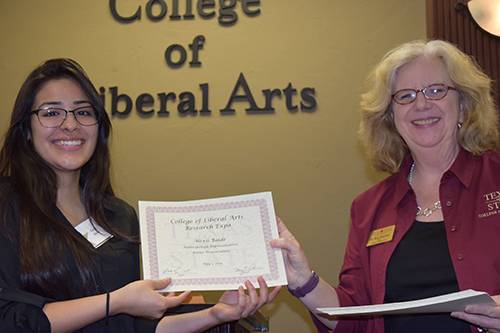
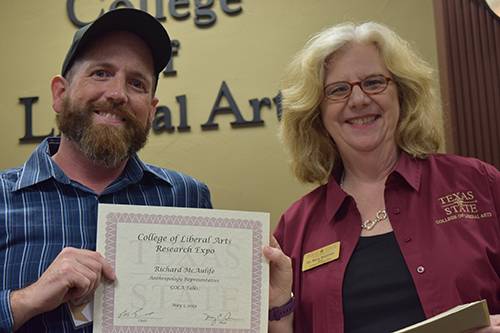
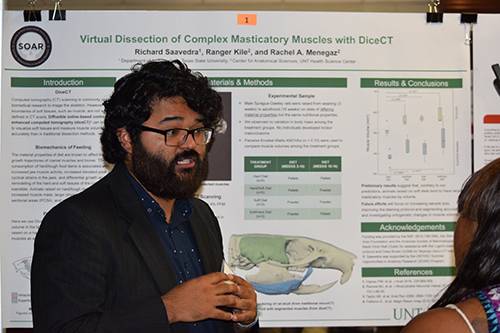
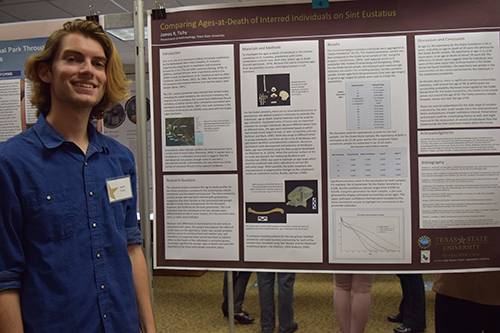
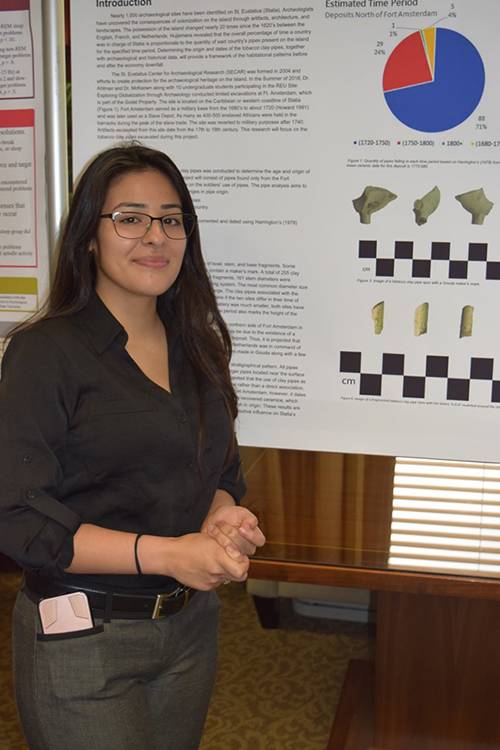
-
Anthropology Undergraduate Students Win 2nd and 3rd Place in Undergraduate Research Conference Poster Competition
Congratulations to anthropology majors Christina Tinsley and Richard Saavedra for winning 2nd and 3rd place, respectively, in the Undergraduate Research Conference poster competition!
Christina Tinsley, Consideration of Possible Anthropophagy: Four Corners Region of the American Southwest, Anthropology
Richard Saavedra, Femoral Length Estimation from Fragmentary Remains, Anthropology
-
Anthropology Department Welcomes New Lambda Alpha Members
On Friday, May 3, 2019 the Anthropology Department held it's first annual Lambda Alpha Awards Banquet. This banquet servers to celebrate the new and existing members of the Lambda Alpha Honors Society.
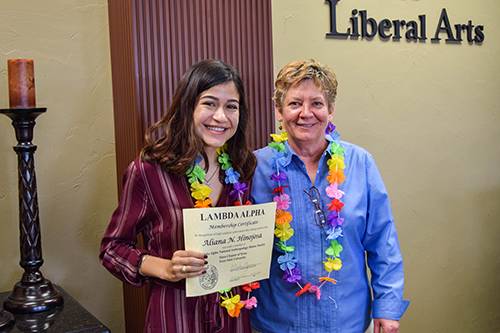
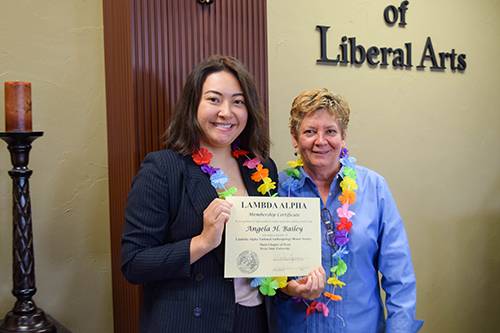
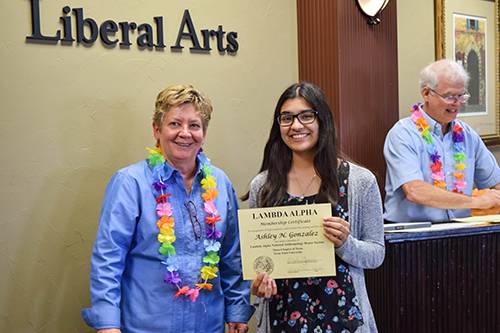
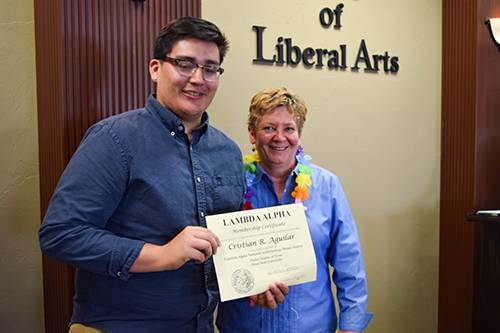
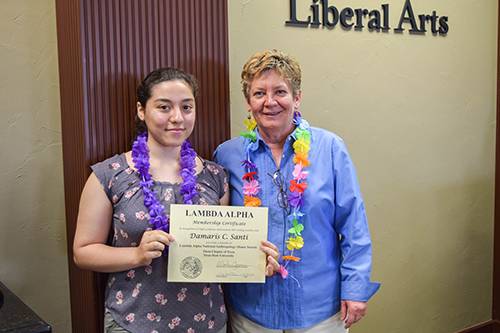
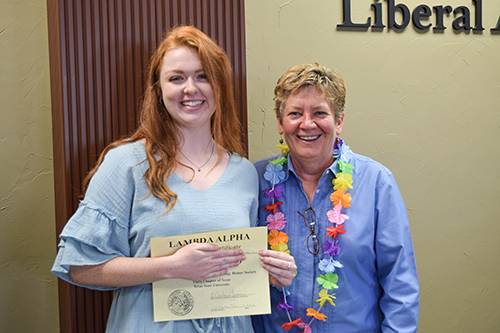
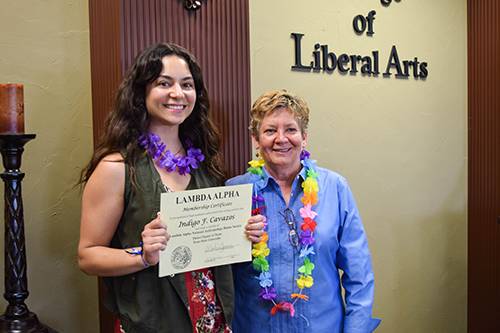
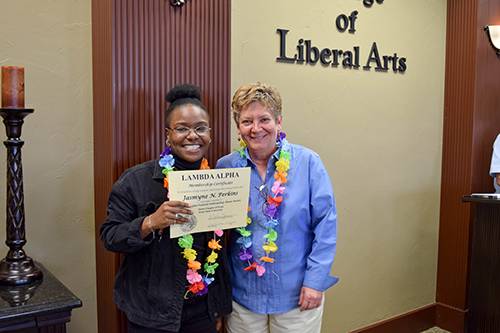
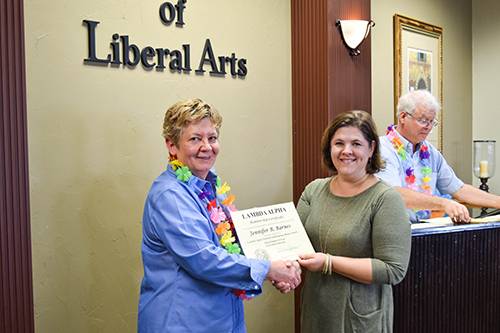
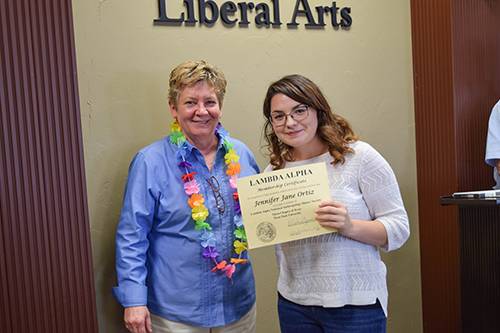
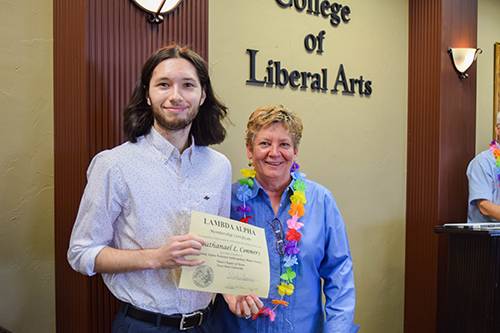
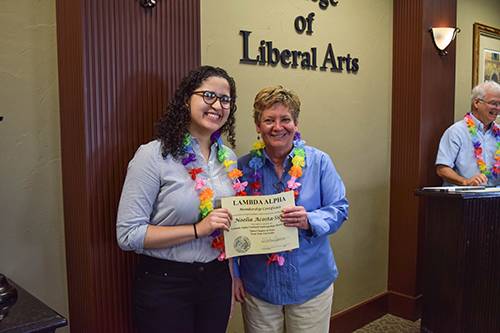
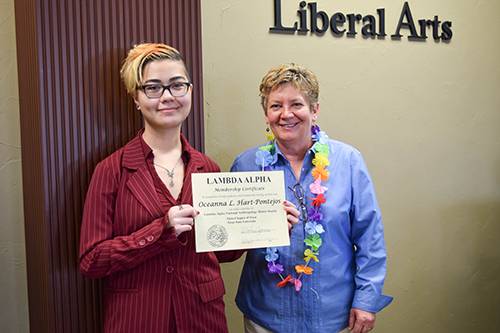
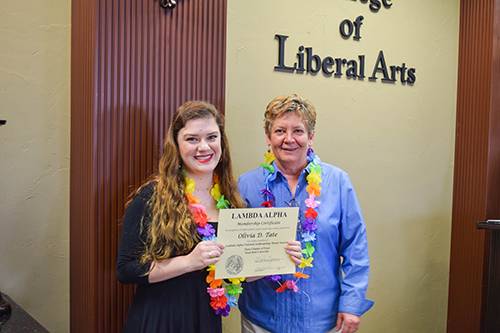
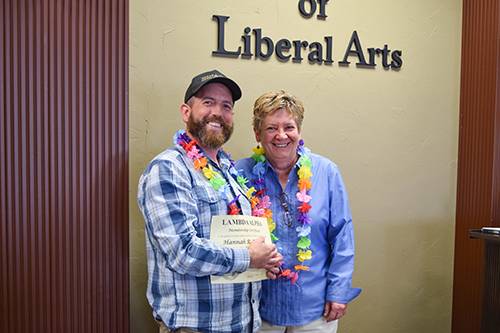
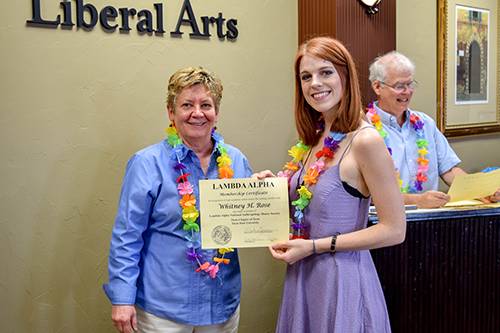
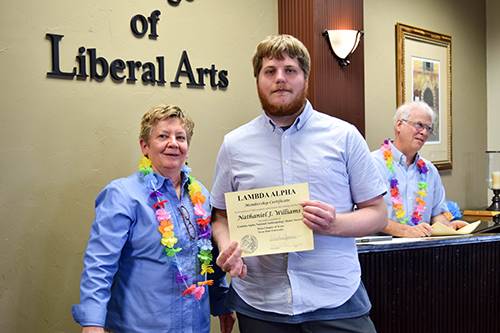
-
Operation Identification Featured on NPR
Congratulations to Dr. Kate Spradely, Ph.D. student Courtney Siegert, and the rest of the Op ID team for a recent NPR feature. On May 21, 2019 NPR posted a piece, "After Grim Deaths In The Borderlands, An Effort To Find Out Who Migrants Were" examining the cases of migrant boarder crossers. NPR conducted interviews with Dr. Spradely and Courtney for the piece to showcase the work of the Op ID team in the effort to identify migrants and return them to their families.
-
Anthropology Students Present Posters at Undergraduate Research Conference
Undergraduate anthropology majors Amanda Rodriguez, Richard Saavedra, and Christina Tinsley presented posters at the 13th annual Undergraduate Research Conference at Texas State University held in April.
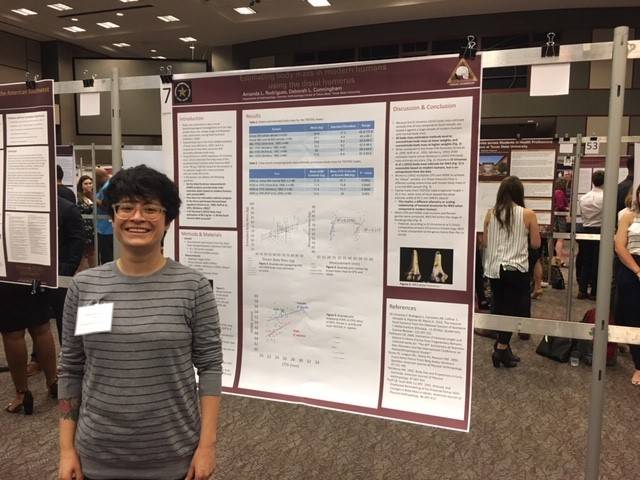

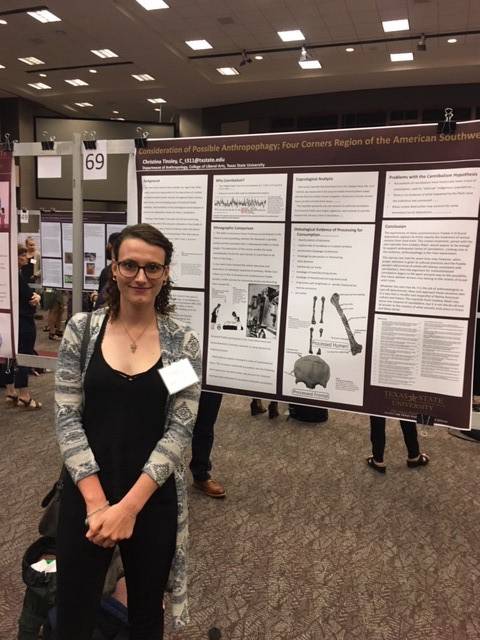
-
Dr. Kent Reilly Awarded Grant
Congratulations to Dr. Kent Reilly who as received a $17,807 grant from the Lannan Foundation to fund the 26th Southeastern Iconography.
-
Congratulations to Graduate Student Sara Morris (Himes)
Sarah Morris (advisor Dr. Britt Bousman) was accepted to the Department of Archaeology PhD program at Simon Fraser University in Canada with a 4-yr support award (full tuition and a generous stipend). She will be working under Prof. Francesco Berna studying geoarchaeology.
-
Undergraduate Anthropology Student Presents Poster at AAPA Annual Meeting
Richard Saavedra, a senior anthropology major, presented research that he completed during a SOAR (Summer Opportunities in Anatomy Research) internship at the UNT at the annual meeting of the American Association of Physical Anthropologists in Cleveland. His poster, entitled "Virtual Dissection of Complex Masticatory Muscles with DiceCT," was co-authored with R. Kile and G.A. Menegaz.

-
Anthropology Graduate Students Win NSF Graduate Research Fellowship Program Awards
MA students McKensey Miller (mentor, Dr. Jill Pruetz) and Megan Veltri (mentor, Dr. Kate Spradley) have won $138,000 NSF Graduate Research Fellowship Program (GRFP)* awards. This is the first time any of our students have won this award.
McKensey’s project focuses on Senegal chimpanzees use of microclimates in a savanna-woodland environment as a means of behavioral thermoregulation.
Megan’s project focuses on using facial asymmetry to understand the biological implications of social race.
Congratulations to McKensey and Megan, and to their mentors, Jill and Kate! This is an outstanding achievement. A special thanks to Dr. Andrea Hilkovitz from the Graduate College. Dr. Hilkovitz works very hard with our students whenever they apply for external funding.
-
Undergraduate Student Chosen for IMLS Internship
Undergraduate anthropology major, Amanda Rodriguez (mentor-Cunningham) was chosen as one of two students for an Institute of Museum and Library Services (IMLS) internship in biological anthropology at the prestigious Field Museum in Chicago. Amanda will join a graduate student to assist with the respectful care of human remains from North America. These paid, 10-week internships are designed to help train future biological anthropologists, bioarchaeologists, and collections managers in both the technical and ethical aspects of human osteological curation, collections management, and research. It is anticipated that the laboratory interns will assist the museum’s bioarchaeologist with osteological inventories, as well as be responsible for re-housing of the remains, data collection, and data entry of new metrics into the museum’s database system.
-
Texas State Students Showcase Hi Tech Archaeology at SXSW
Archaeology graduate students won an invitation to the 2019 Texas State Innovation Lab at SXSW to showcase how 3D technology is being used to record and investigate archaeological sites in the Lower Pecos Canyonlands of Southwest Texas. The Texas State University Innovation Lab @ SXSW Interactive Festival was designed to provide the public an exclusive look at students using and creating breakthrough technology that solves real-world problems. Members of Texas State’s Ancient Southwest Texas Project Sean Farrell, Janaka Greene, Emily McCuistion, and Victoria Pagano, along with faculty mentor David Kilby, all demonstrated the use of Structure from Motion graphic technology to create georeferenced precision 3D models of archaeological sites, features, and artifacts. In addition to aiding in research, documentation, and preservation, these models provide a way for members of the public to virtually visit archaeological sites that might otherwise be inaccessible due to remote locations or private land. The presentation attracted the interest of both archaeology and tech fans in equal amounts. The ASWT crew even created a 3D model of the display itself in real time for attendees.
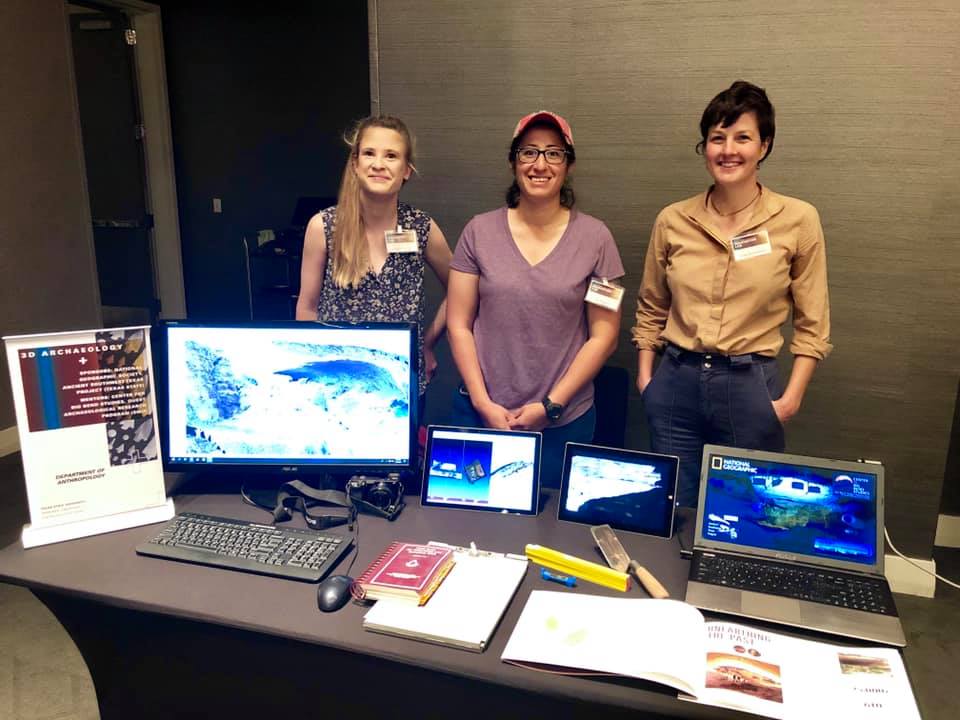
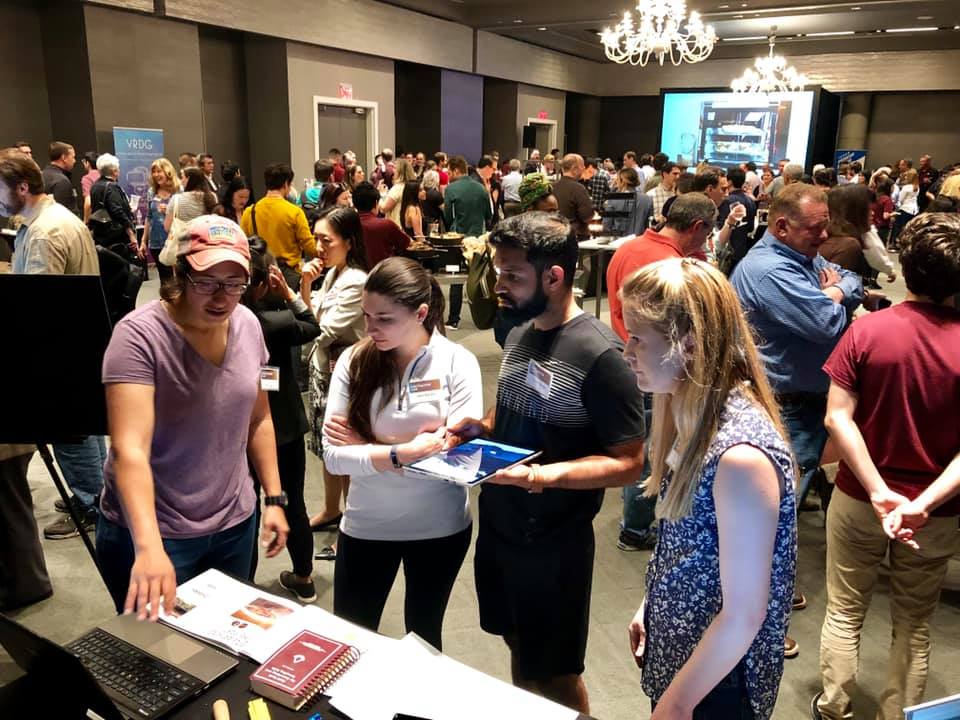
-
Dr. Kate Spradley's research featured in Open Anthropology, a public journal of the American Anthropological Association
Dr. Spradley's 2014 paper "Toward Estimating Geographic Origin of Migrant Remains along the United States-Mexico Border" is featured in the latest issue of Open Anthropology - Walls, Fences, and Barriers: Anthropology on the Border.
Open Anthropology is an open-access, public journal that helps bring anthropology into "the public conversation about critical social issues and policy debates" by focusing on "a selection of articles relevant to contemporary concerns".
-
Doctoral Student Wins Grant
Doctoral student, Sophia Mavroudas, is the recipient of a Society of Forensic Anthropologists (SOFA) Atlas grant in the amount of $750.00, with her Co-PI Dr. Victoria Dominguez from Lehman College. Their project is entitled, Exploring the potential for microCT analysis on histological age markers, which will be initiated in April 2019 and completed March 2020. The aim of this project is to use microCT to quantify trabecular changes within the human 6th rib to explore how these variables correlate with age. The ultimate goal is improve age at death estimation methods for the biological profile.
-
Outstanding Anthropology Students
Our 2019 Outstanding Undergraduate Student in Anthropology is Richard McAuliffe and our runner-up is Angela Bailey.
These undergraduate students have won Academic Excellence Awards:
Garrett Adams
Bennett Dampier
Richard McAuliffe
Angela Bailey
Kasey Ellington
Whitney Rose
Reece Black
Michael Eppler
Adrienne Stainton
Chandler Buchfink
Sarah Haynes James Tichy
Megan Copeland
Natalie Little Kimberly Wile
Our 2019 Outstanding Master’s Student is Caroline Znachko and our runner-up is Alejandro Allen.
The Outstanding Student and Academic Excellence awards will be presented at the College of Liberal Arts Awards Day on Wednesday, April 24, 2019 at 5:00 pm on the 11th floor of J.C. Kellam (JCK) building.
-
Dr. Nicholas Herrmann receives the CAARI/CAORC Fellowship for work in Cyprus
Dr. Nicholas Herrmann has received the 2019 Cyprus American Archaeological Research Institute (CAARI) / Council of American Overseas Research Centers (CAORC) Fellowship for work on the Hellenistic to Early Christian burial samples from Ayioi Omoloyites in Lefkosia and Ancient Kition in Larnaka. The fellowship will provide travel support and research funds for Dr. Herrmann and Texas State graduate students while in Cyprus this summer.
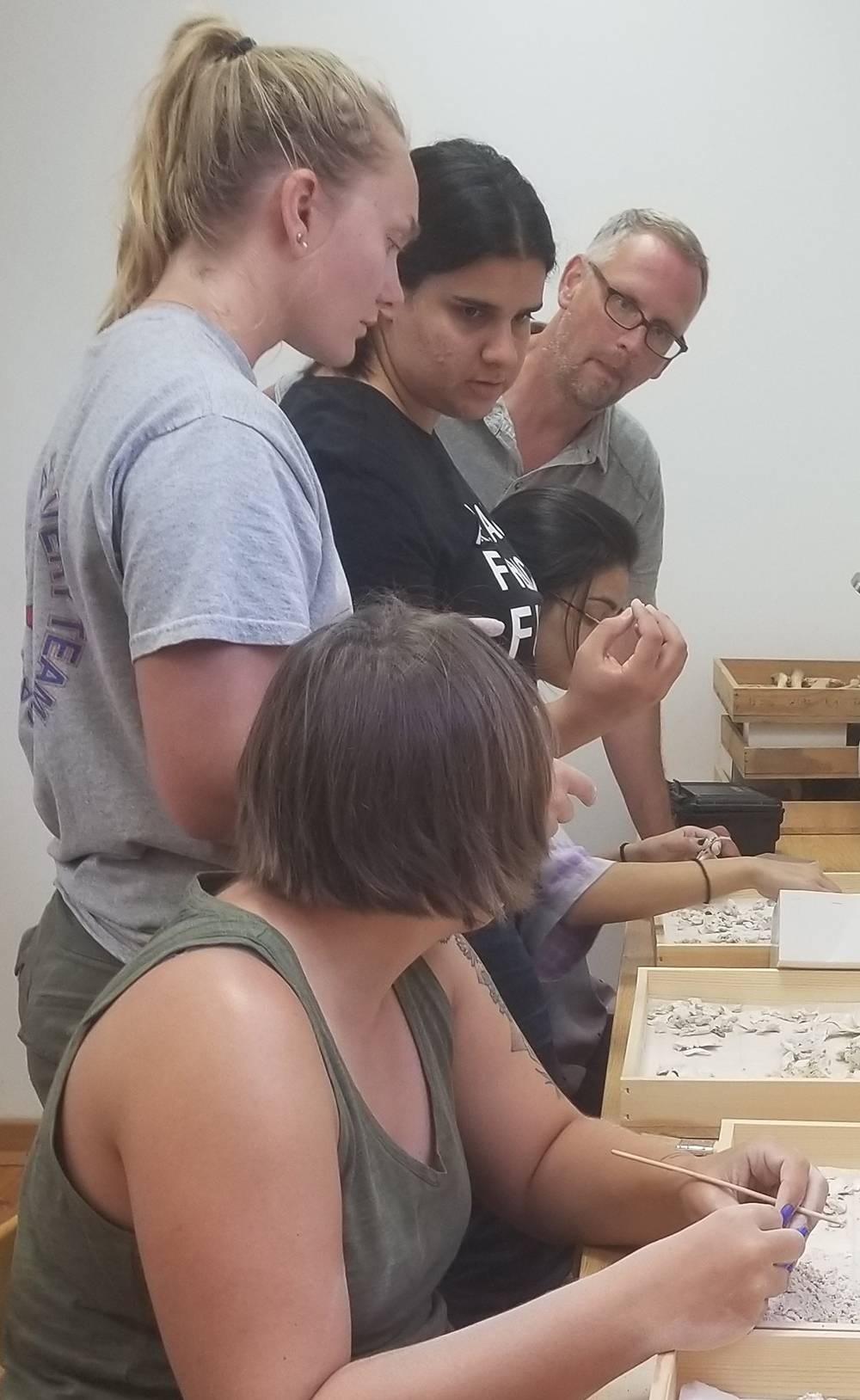
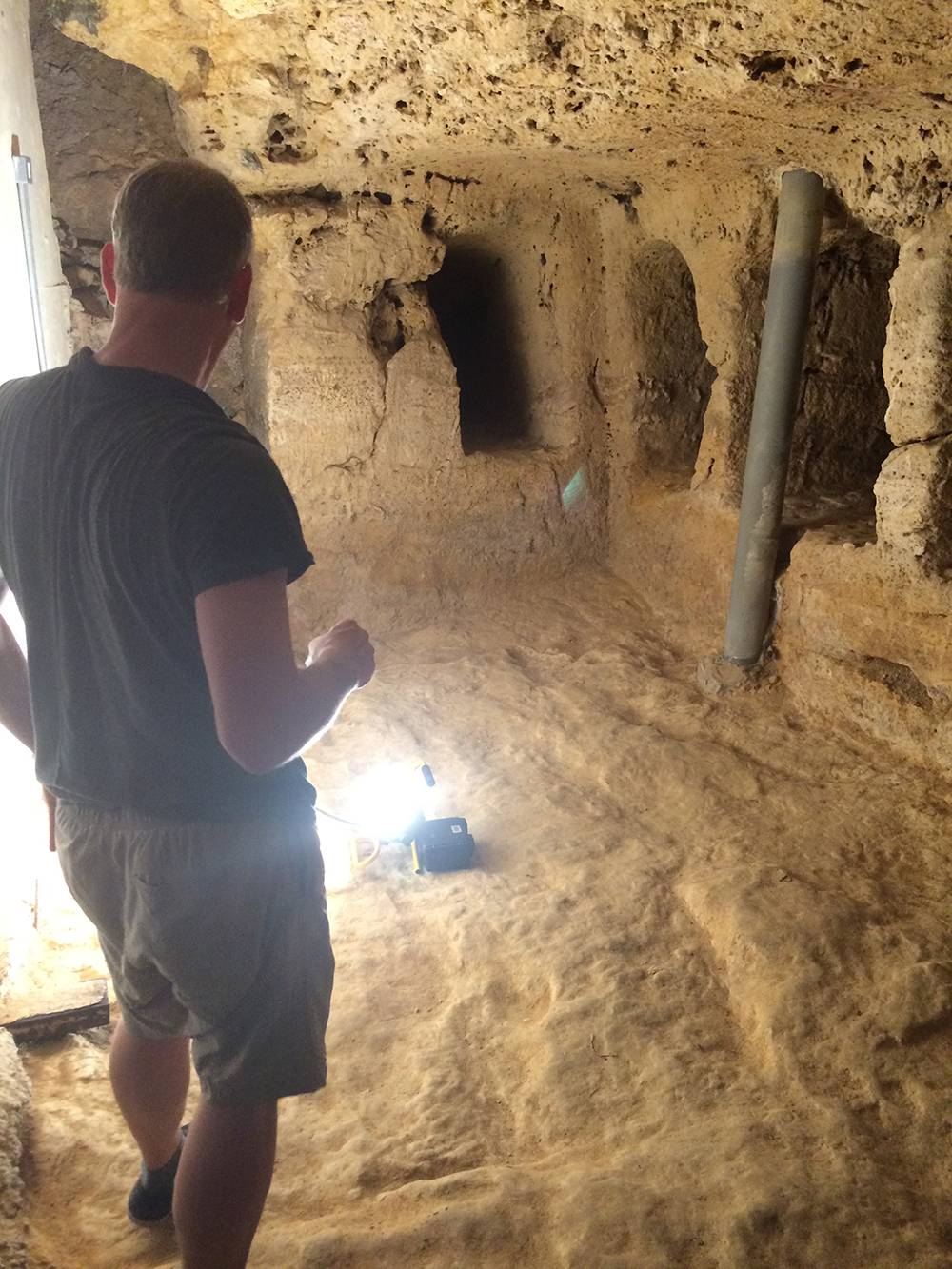
-
Anthropologist studies primates as key to early human evolution
Anthropology Department professor, Dr. Jill Pruetz, was recently featured by the Texas State Newsroom. The piece about Dr. Pruetz examines her work studying chimps and her larger career as an Anthropologist. You can find a full article on the Texas State Newsroom page.
-
Dr. Jill Pruetz | Distinguished Lecture at the Houston Museum of Natural Science
The understanding of fire is one of the traits that sets humans apart in the animal kingdom. Primatologist Dr. Jill Pruetz will explain how savanna chimpanzees in Fongoli, Senegal exhibit a behavior not common to other animals in the face of grassland wildfires.
Similar to the chimpanzee "rain dance" observed by Jane Goodall during approaching storms, Pruetz has witnessed alpha male chimp perform ritualistic "fire dance" while facing the flames. The Fongoli chimps exhibit no signs of panic or flight as animals normally exhibit with wildfires. Instead the Fongoli chimps observe and monitor carefully in preparation for the tribe response to the leading edge of the fire. Should we expect less from our closest living relative, the chimpanzee?
Biological anthropologist and primatologist Dr. Jill Pruetz is director of the Fongoli Savanna Chimpanzee Project and founder of Neighbor Apes. Pruetz is professor of anthropology at Texas State University and a National Geographic Society Emerging Explorer.
-
Operation Identification Featured in New York Times
Drs. Kate Spradely, Nick Herrmann, and their students were recently featured in a New York Times piece for their work on Operation Identification at Sacred Heart Burial Park. The article, Along the U.S.-Mexico Border, can be found here.
-
Dr. Carolyn Boyd to Speak at UCLA
Dr. Carolyn Boyd has been invited to give a lecture at UCLA as part of the Costen Public Lecture Series. Her talk, A Painted Landscape: Lower Pecos Rock Art, draws on twenty-five years of archaeological research and insight from ethnohistory and art history, to identify patterns in art that relate to the mythologies of Uto-Aztecan speaking peoples, including the Aztec and contemporary Huichol.
The talk will take place at the California Nano Systems Institute at UCLA, February 12, 2019 at 7. More information can be found on the UCLA Event Page.
-
Texas States Represented at Florida Tribe's Harvest Busk
Dr. Kent Reilly, along with current and former students, were recently invited to participate in the Harvest Busk of the Florida Tribe of the Eastern Creeks at the White Earth Community/Square Ground.
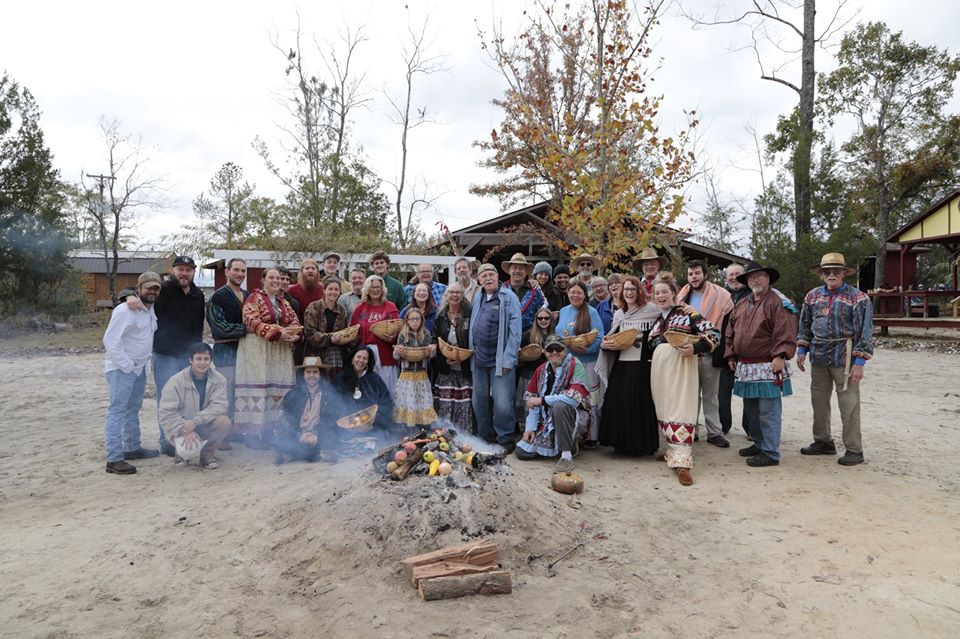
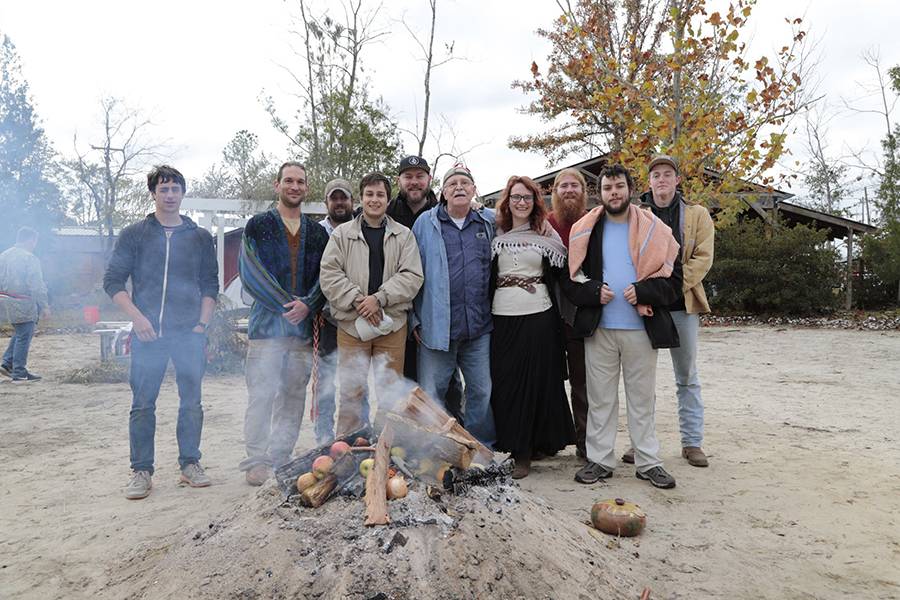
-
Hannah Munsch presents Honors Thesis research
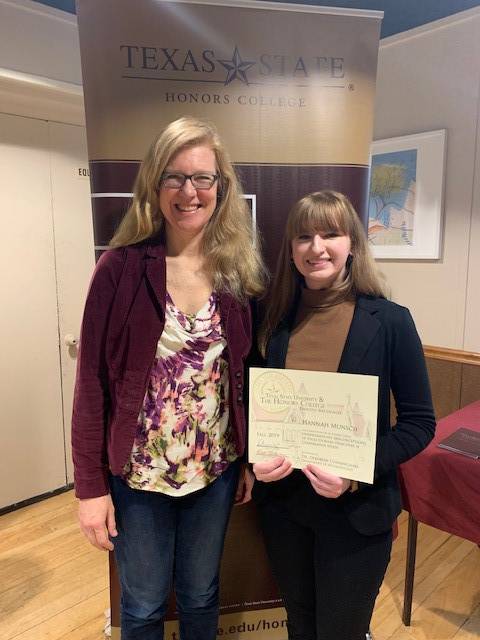 Anthropology undergraduate major Hannah Munsch (mentor: Dr. Cunningham) presented her undergraduate Honors Thesis entitled "Undergraduate misconceptions of evolutionary principles: a comparative study." Congratulations Hannah!
Anthropology undergraduate major Hannah Munsch (mentor: Dr. Cunningham) presented her undergraduate Honors Thesis entitled "Undergraduate misconceptions of evolutionary principles: a comparative study." Congratulations Hannah! -
Congratulations to MA Students Molly Kaplan and Mariah Moe
Molly Kaplan, MA student under Dr. Kate Spradley, received a $1,500.00 Forensic Sciences Foundation travel grant.
Mariah Moe, MA student under Dr. Kate Spradley, won the AAFS Anthropology Section Diversity Award $1,000.00 student travel award.
-
Congratulations to Courtney Siegert and Sophia Mavroudas
Doctoral students Courtney Siegert and Sophia Mavroudas won $1,500 Forensic Sciences Foundation/CRC Press Student Travel Grants, which also includes complimentary registration to the American Academy of Forensic Science 72nd Annual Scientific Meeting in Anaheim, CA, in February 2020.
In addition, Sophia was chosen as the Book Prize Recipient by CRC and will receive $1,500-worth of pre-selected books and a plaque at the Academy’s Annual Business Meeting.
-
Texas State Students Win Research Awards at Texas Association of Biological Anthropologists Meeting
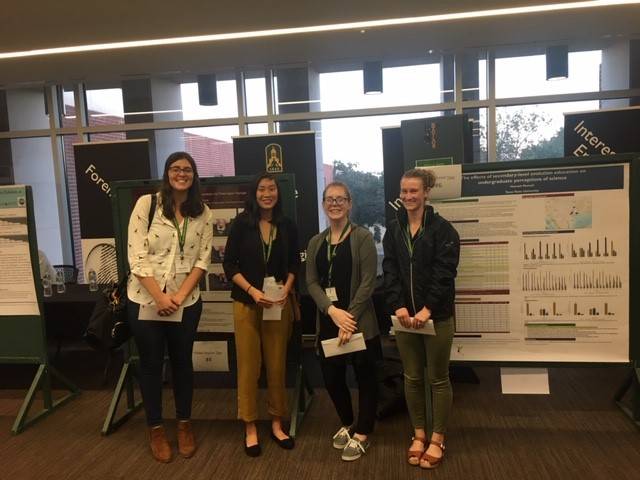 Two Texas State students won research awards at this year's Texas Association of Biological Anthropologists meeting held at Baylor University from November 8-9.
Two Texas State students won research awards at this year's Texas Association of Biological Anthropologists meeting held at Baylor University from November 8-9.Olivia Green won the undergraduate poster research award for her collaborative project entitled "Comparing patters of pathology in enslaved Africans of an 18th century cemetery on St. Eustatius." This research project was an outgrowth from her experience in the Texas State’s Research Experience for Undergraduates program “Exploring Globalization through Archaeology" headed by Drs. McKeown, Ahlman, and Hermann.
McKensey Miller won the graduate poster award for her master's thesis research under the guidance of Dr. Jill Pruetz: "The importance of microclimates: Environmental differences between habitats at Fongoli, Senegal."
-
Texas State Students Attend and Present Research At Texas Association of Biological Anthropologists Meeting
Numerous Texas State undergraduate and graduate students attended the annual Texas Association of Biological Anthropologists (TABA) annual meeting hosted by Baylor University on November 8 - 9. Five undergraduate research projects (some from internships and Honors College theses) were presented and one graduate student's master's thesis research project was presented.
Undergraduate research:
- Laci L. Frank: Estimating stages of facial decomposition via time-lapse footage
- Olivia Green, Ashley McKeown, Nick Hermann: Comparing patterns of pathology in enslaved Africans of an 18th century cemetery
- Hannah Munsch: The effects of secondary-level evolution education on undergraduate perceptions of science
- Amanda L. Rodriguez, Deborah Cunningham, Danny Wescott, Rob McCarthy: Association between distal humerus measurements and body mass in modern humans: Application for fossil hominin MK3
- Christina Tinsley: Proportional trends in dental metrics of Texas Hispanic individuals: Forensic ancestry application
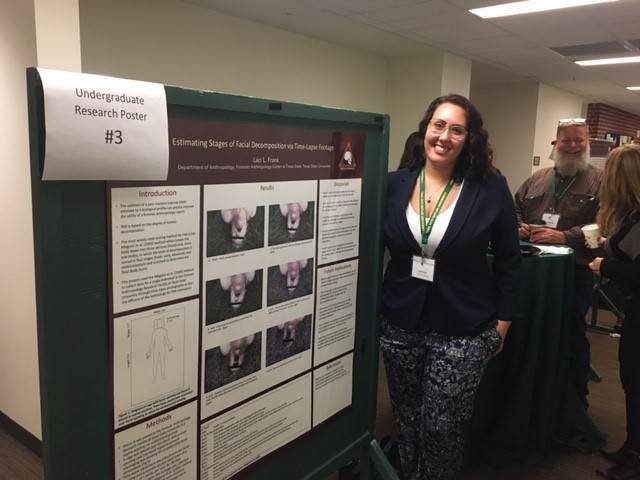
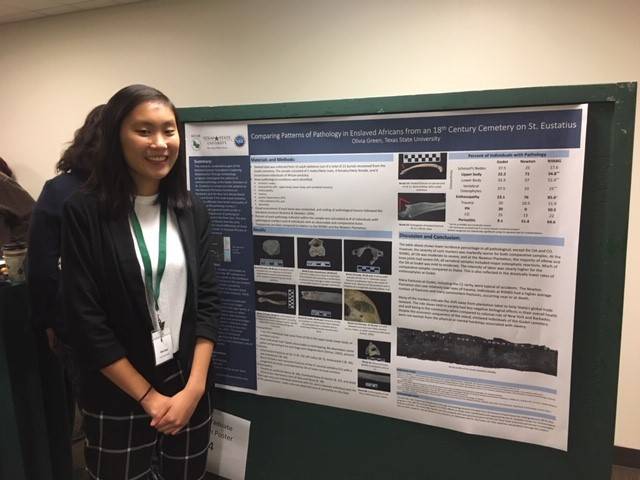
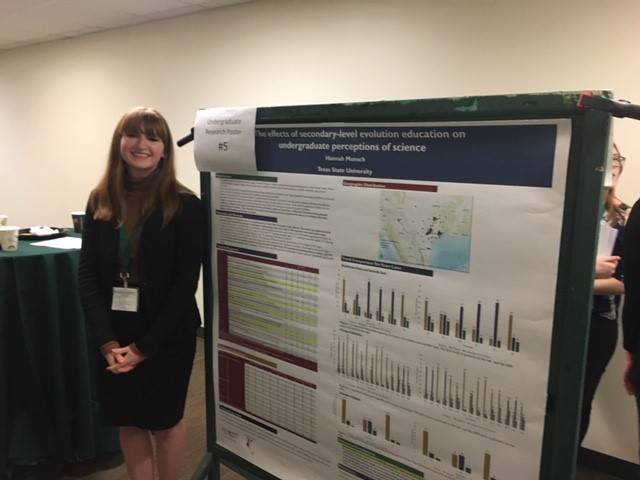
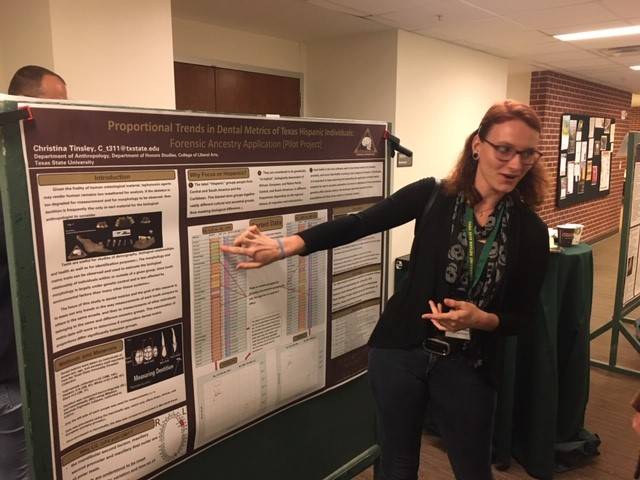
Left to right: Laci L. Frank, Olivia Green, Hannah Munsch, Christina TinsleyGraduate research:
- McKensey Miller, Jill Pruetz: The importance of microclimates: Environmental differences between habitats at Fongoli, Senegal
Other Student Photos
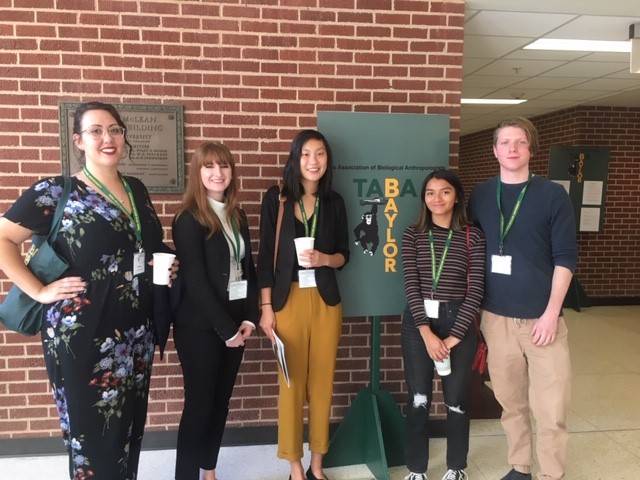
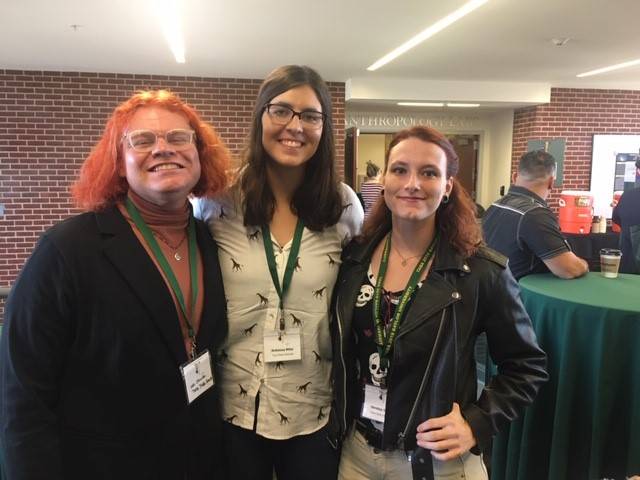
From left to right: (first image) Laci Frank, Hannah Munsch, Olivai Green, Veronica Flores-Guiillen, Ian Long
second image: Cole Clawson, McKensey Miller, Christina Tinsley -
Congratulations to Anneke Paterson and Dr. Nicole Taylor!
Anneke Paterson (mentor Dr. Nicole Taylor) has been awarded the URF scholarship in the amount of $630, to support her research project titled Visually Re-Membering the Eastside: Trajectories of Belonging and Displacement in Austin.
-
Dr. Nicole Taylor Featured in Another Bustle.com Article
Dr. Taylor was featured in a recent Bustle.com article on how to use your phone more mindfully.
-
Dr. Nicole Taylor Interviewed by Bustle.com
Dr. Taylor was interviewed recently by Bustle.com about social media and mental health.
-
CAS awarded Cooperative Agreement with USACE
This week CAS was awarded a cooperative agreement with the USACE for Cultural Resources Support for US Air Force Civil Engineering Center (AFCEC) Midwest Region Installations for $686,194. This includes continued support for staff positions at Hill Air Force Base in Utah and Peterson Air Force Base in Colorado and funding for historic building surveys of Peterson Air Force Base and Schriever Air Force Base (teamed with Historical Research Associates, Inc.), an archaeological survey of Schriever Air Force Base teamed with Metcalf Archaeological Consultants, and GIS data updates of site boundaries at the US Air Force Academy. The latter two projects will include Texas State students.
-
Dr. Wescott Receives Grant From Forensic Science Foundation
Dr. Wescott recently received $5,964 from the Forensic Science Foundation for his research project "Detection of Clandestine Surface and Buried Remains in Central Texas Using Unmanned Aerial Systems equipped with Infrared and Near-Infrared Sensors: Relationship between Ground Truth and Sensor Data"
-
Dr. Wescott featured in Ologies with Alie Ward
Dr. Wescott was recently featured in Ologies with Alie Ward, a comedic science podcast, where they discussed Osteology and the Forensic Anthropology Research Center (FACTS).
-
Two Doctoral Students Win Graduate Research Fellowships
Two of our doctoral students have won Graduate Research Fellowships in Science, Technology, Engineering, and Mathematics from the National Institute of Justice.
Courtney Siegert’s award is for $150,000 and her project is titled, “A Multifactorial Approach to Estimating Geographic Origin of Hispanics Using Cranial and Dental Data." Courtney’s doctoral advisor is Kate Spradley.
Devora Glieber’s award is for $150,000 and her project is titled, “Detection and Diagnosis of Mobility Impairment via Cortical and Trabecular Bone Properties to Aid in the Identification of Human Remains in a Medicolegal Context.” Devora’s doctoral advisor is Danny Wescott.
-
Dr. Danny Wescott Receives National Institute of Justice Grant
Dr. Danny Wescott has received an National Institute of Justice grant for $286,468 for the project Detecting and Processing Clandestine Human Remains with Unmanned Aerial Systems and Multispectral Remote Sensing.
-
Dr. Kate Spradley named co-PI on National Institute for Justice Grant
Dr. Kate Spradley is a co-PI on a grant that received funding from the National Institute for Justice for $785,827. The project title is "Subadult ancestry estimation using craniometrics, macromorphoscopics, odontometrics, and dental morphology."
Collaborators are from University of Nevada, Reno including Kyra Stull (PI), and co-PIs Marin Pilloud, and Richard Scott.
-
Dr. Nicole Taylor Interviewed by NBC Better
Dr. Taylor was recently interviewed by NBC Better about how parents can address weight loss with children, encourage a healthy relationship with food and exercise, and balance the risk of disordered eating against the risk of an overweight or obese child. You can read the interview on NBC Better.
-
Dr. Kate Spradley Receives Grant for Operation Identification
Congratulations to Dr. Kate Spradley who was recently awarded a $200,000 grant from the state's Homeland Security Grants Division (HSGD) for Operation Identification.
-
Veteran's Curation Program Renewed
Congratulations to Amy Reid and everyone at CAS. The Veteran’s Curation Program agreement has been renewed for another year with a total award of $225,228.
-
Dr. Christi Conlee on the Discovery Channel
Congratulations to Christi Conlee whose archaeological work in Peru was featured on the Discovery Channel show, Mysteries in the Alien Desert, on 7-14-19. Christi started an NSF funded project this summer Nasca.
-
